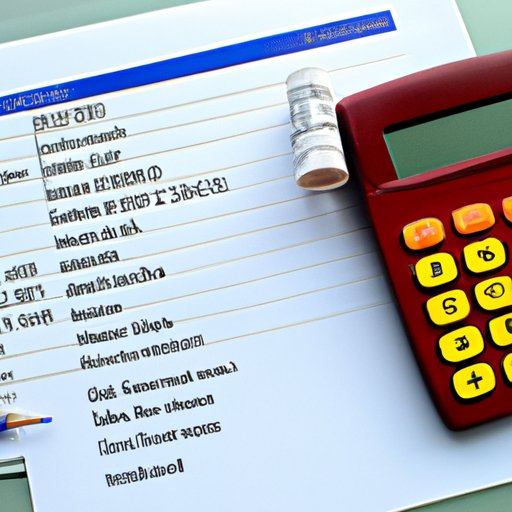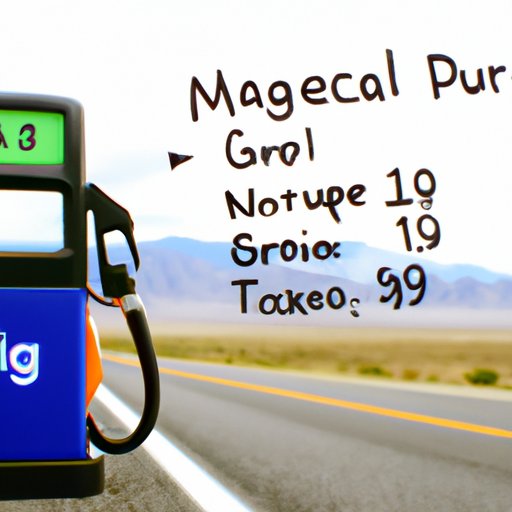Introduction
Planning a road trip can be an exciting adventure, but it’s important to factor in all the costs associated with travel. One of the biggest expenses for any trip is gas, and it can be difficult to estimate how much you’ll need to budget for fuel. Knowing how to accurately calculate and budget for gas expenses can help ensure that you have enough money for your trip and don’t end up spending more than you bargained for.

Calculating the Cost of a Gas Trip: Guidelines for Estimating Fuel Expenses
When calculating the cost of a gas trip, the first step is to consider the type of vehicle you’ll be using and its fuel efficiency. The average car gets about 25 miles per gallon (MPG), but this number can vary depending on the make and model. You should also factor in the type of fuel your vehicle uses, as different fuels may have different costs per gallon.
Once you know the MPG of your vehicle, you’ll need to estimate the total miles traveled. This will involve calculating the distance from your starting point to your destination, plus any detours or stops along the way. It’s important to overestimate the number of miles you’ll be traveling, as unexpected delays or detours can increase your mileage.
Once you know the total miles traveled, you can calculate the cost per mile. To do this, simply divide the estimated cost of gas by the estimated miles traveled. For example, if you’re driving a car that gets 25 MPG and the cost of gas is $2.50 per gallon, your cost per mile would be 10 cents ($2.50/25 = 0.10). Keep in mind that this number may not be exact, as other factors such as tolls, taxes, and fees can affect the cost of your trip.

Budgeting for a Road Trip: Tips for Projecting Gas Prices
In addition to calculating the cost per mile, it’s important to budget for gas prices. Before you set out on your trip, research current gas prices along your route. This will give you an idea of what to expect and allow you to adjust your budget accordingly. Additionally, choose the most cost-effective route to save money on gas. This may involve taking back roads or avoiding major cities where gas prices are typically higher.
It’s also a good idea to monitor gas prices before and during your trip. Many gas station apps allow you to compare prices in your area so you can find the best deal. Additionally, some apps offer discounts or cash back rewards when you fill up at certain stations, so it’s worth checking these out before you hit the road.
Planning a Vacation? Here’s How Much You Should Allot for Gas
When planning a vacation, it’s important to determine how much you should budget for gas. Start by estimating the total cost of gas for your trip, including the cost per mile and any additional expenses such as tolls, taxes, and fees. Then, take into account additional expenses such as food and lodging. Finally, set aside some money for unexpected costs that may come up during your trip.
Make Sure Your Gas Budget is Realistic: Strategies for Accurately Estimating Fuel Costs
To make sure your gas budget is realistic, check the price of gas from your starting point to your destination. This will give you an idea of what to expect and allow you to adjust your budget accordingly. Additionally, factor in potential delays or detours that may increase your mileage. You can also use an online calculator to estimate your gas costs, which can be useful if you’re unsure of your vehicle’s MPG.
Don’t Let Gas Prices Dictate Your Travel Plans: Tips for Calibrating Your Gas Budget
If you’re worried about gas prices, there are several ways to save money on gas. Consider alternate forms of transportation such as buses, trains, or planes. If you’re driving, look for ways to save money on gas such as carpooling with friends or family or using cruise control whenever possible. Additionally, many gas stations offer discounts for cash payments, so it’s worth checking this out before you hit the road.
How to Calculate Gas Mileage and Plan for Maximum Efficiency on Your Next Trip
Calculating your car’s MPG is the first step in planning for maximum efficiency on your next trip. Start by researching your vehicle’s fuel efficiency and then analyze your driving habits to see if there are any changes you can make to maximize fuel efficiency. Keeping your car well-maintained is also essential, as regular maintenance can help improve fuel economy.

Avoid Unnecessary Expenses: Tips for Saving Money on Gas During Your Next Trip
Finally, there are several ways to avoid unnecessary expenses and save money on gas during your next trip. Choose the most direct route to minimize mileage and reduce the amount of time you spend on the road. Additionally, limit the number of stops you make and use cruise control whenever possible. These small changes can add up and help you save money on gas.
Conclusion
Accurately calculating and budgeting for gas expenses on your next trip is essential for ensuring that you have enough money for your trip. By considering the type of vehicle and fuel efficiency, estimating total miles traveled, and factoring in additional costs such as tolls and taxes, you can get a better idea of how much to budget for gas. Additionally, researching current gas prices and choosing the most cost-effective route can help you save money. With these tips and strategies, you’ll be able to plan and budget for a successful and enjoyable road trip.
(Note: Is this article not meeting your expectations? Do you have knowledge or insights to share? Unlock new opportunities and expand your reach by joining our authors team. Click Registration to join us and share your expertise with our readers.)
